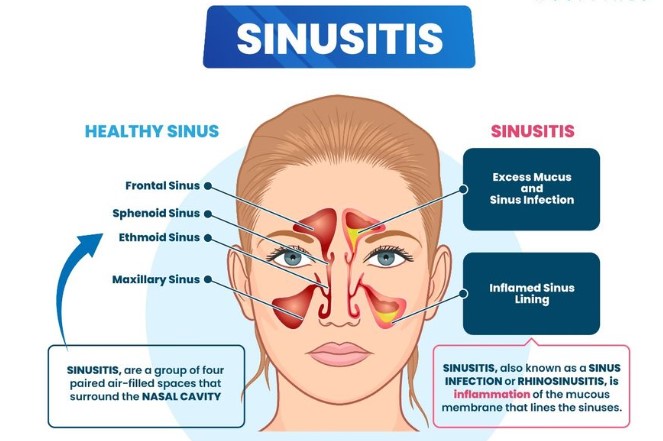What Causes Sinusitis Earache? Find Relief

Sinusitis, an inflammation or infection of the sinuses, can be a debilitating condition that affects millions of people worldwide. One of the most common symptoms of sinusitis is an earache, which can range from a dull, throbbing pain to a sharp, stabbing sensation. But what causes sinusitis earache, and how can you find relief from this frustrating condition?
To understand the relationship between sinusitis and earache, it’s essential to explore the anatomy of the sinuses and the ears. The sinuses are a network of air-filled cavities located in the skull, responsible for producing mucus that helps to filter, humidify, and warm the air we breathe. The ears, on the other hand, are complex organs that not only enable us to hear but also play a crucial role in maintaining our balance and equilibrium.
The Eustachian tube, a small, narrow tube that connects the middle ear to the back of the throat, is the key to understanding how sinusitis can cause earache. When the sinuses become inflamed or infected, the excess mucus production can lead to congestion and blockage of the Eustachian tube. This blockage can cause the middle ear to become filled with fluid, leading to pressure buildup and pain.
There are several factors that can contribute to the development of sinusitis earache. These include:
- Anatomical issues: The shape and size of the sinuses and the Eustachian tube can affect the flow of mucus and air, making some people more prone to sinusitis and earache.
- Allergies: Allergies to dust, pollen, or other environmental factors can trigger sinusitis and earache.
- Respiratory infections: Colds, flu, and other respiratory infections can spread to the sinuses, causing inflammation and infection.
- Nasal polyps: Growths in the nasal passages can obstruct the flow of mucus and air, leading to sinusitis and earache.
- Deviated septum: A crooked or off-center partition between the nostrils can affect breathing and increase the risk of sinusitis and earache.
Sinusitis earache can be a challenging condition to diagnose, as the symptoms can be similar to those of other conditions, such as otitis media (middle ear infection) or temporomandibular joint (TMJ) disorder. However, a thorough medical examination, including a physical examination, medical history, and diagnostic tests such as a CT scan or MRI, can help to identify the underlying cause of the earache.
Fortunately, there are several ways to find relief from sinusitis earache. These include:
- Nasal decongestants: Over-the-counter medications such as pseudoephedrine or phenylephrine can help to reduce congestion and relieve pressure in the sinuses and ears.
- Pain relievers: Acetaminophen or ibuprofen can help to alleviate pain and reduce inflammation.
- Antibiotics: If the sinusitis is caused by a bacterial infection, antibiotics may be prescribed to help clear the infection.
- Nasal corticosteroids: Prescription medications such as fluticasone or triamcinolone can help to reduce inflammation and congestion in the sinuses.
- Ear drops: Over-the-counter ear drops such as carbamide peroxide or urea peroxide can help to relieve ear pain and reduce inflammation.
In addition to these medical treatments, there are several self-care measures that can help to alleviate sinusitis earache. These include:
- Staying hydrated: Drinking plenty of fluids can help to thin out mucus and promote drainage.
- Using a humidifier: Adding moisture to the air can help to reduce congestion and relieve sinus pressure.
- Applying warm compresses: Applying a warm, damp washcloth to the face and forehead can help to loosen mucus and promote drainage.
- Elevating the head: Sleeping with the head elevated can help to reduce congestion and promote drainage.
Self-Care Measures for Sinusitis Earache

- Stay hydrated by drinking plenty of fluids, such as water, juice, or tea.
- Use a humidifier to add moisture to the air, especially in dry environments.
- Apply warm compresses to the face and forehead to loosen mucus and promote drainage.
- Elevate the head while sleeping to reduce congestion and promote drainage.
While sinusitis earache can be a painful and frustrating condition, there are several treatments and self-care measures that can help to alleviate symptoms and promote relief. By understanding the causes of sinusitis earache and taking steps to manage the condition, individuals can reduce their risk of developing complications and improve their overall quality of life.
What are the most common symptoms of sinusitis earache?
+The most common symptoms of sinusitis earache include ear pain, pressure, or fullness, as well as nasal congestion, sinus pressure, and difficulty hearing.
How can I prevent sinusitis earache?
+To prevent sinusitis earache, individuals can take steps to manage allergies, avoid respiratory infections, and maintain good nasal and sinus health through the use of nasal saline irrigations and humidifiers.
What are the complications of untreated sinusitis earache?
+Untreated sinusitis earache can lead to complications such as chronic sinusitis, ear infections, and hearing loss. In rare cases, it can also lead to more serious conditions such as meningitis or brain abscess.
By understanding the causes and symptoms of sinusitis earache, individuals can take steps to manage the condition and reduce their risk of developing complications. With the right treatment and self-care measures, it is possible to find relief from sinusitis earache and improve overall quality of life.